

Debt-Sinners. What is Debt? – An Interview with Economic Anthropologist David Graeber. David Graeber currently holds the position of Reader in Social Anthropology at Goldsmiths University London.
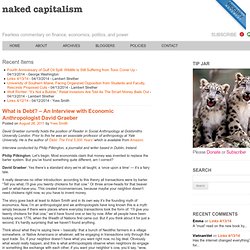
Prior to this he was an associate professor of anthropology at Yale University. He is the author of ‘Debt: The First 5,000 Years’ which is available from Amazon. Interview conducted by Philip Pilkington, a journalist and writer based in Dublin, Ireland. Seminar on David Graeber’s Debt – admin notice. We’ve now received and published all the contributions in our online seminar on David Graeber’s Debt: The First 5000 Years .

Too Big To Fail: The First 5000 Years. One of the many fascinating pieces of information that David Graeber tosses off like shrapnel in Debt is that the first recorded appearance of the word “freedom” in a political document is in a Sumerian proclamation of a debt amnesty or jubilee.
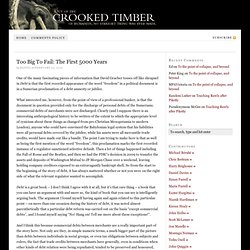
What interested me, however, from the point of view of a professional banker, is that the document in question provided only for the discharge of personal debts of the Sumerians; commercial debts of merchants were not discharged. Clearly (and I suppose there is an interesting anthropological history to be written of the extent to which the appropriate level of cynicism about these things as changed from pre-Christian Mesopotamia to modern London), anyone who could have convinced the Babylonian legal system that his liabilities were all personal debts covered by the jubilee, while his assets were all mercantile trade credits, would have made out like a bandit.
This sets in motion the dzamalag exchange. Seminar on Debt: The First 5000 Years – Reply. Let me begin with an apology—for two things, actually.
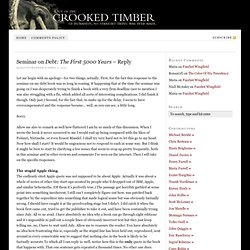
First, for the fact this response to the seminar on my debt book was so long in coming. It happening that at the time the seminar was going on I was desperately trying to finish a book with a very firm deadline (not to mention I was also struggling with a flu, which added all sorts of interesting complications. I did finish it though.
Only just.) Second, for the fact that, to make up for the delay, I seem to have overcompensated and the response became… well, as you can see, a little long. Sorry. Allow me also to remark as well how flattered I am by so much of this discussion. The stupid Apple thing. Impersonal relations. Another brief corrective while I’m at it: I’m also not saying that having lots of social relations are always inherently good and therefore the loss of social ties is always bad, violent, or oppressive. Human Economies. The problem is that I use the term in three increasingly inclusive senses. 3. 2. 3. A. 3. When Debt Is More Important Than People, The System Is Evil.
Submitted by Charles Hugh Smith from Of Two Minds When Debt Is More Important Than People, The System Is Evil The Empire of Debt has only one end-point: a death spiral. It is evil and must be dismantled. Ethics has no place in the Empire of Debt. The financialized Status Quo is careful to limit the language used to describe the situation in Greece to the subtexts of "obligations" and "avoiding chaos. " The reality being masked is that debt is now more important than people. 1. 2. This begs further investigation.
The ethics of debt, at least in the officially sanctioned media, boils down to: nobody made them borrow all those euros, and so their suffering is just desserts. What's lost in this subtext is the responsibility of the lender. Consider an individual who is a visibly poor credit risk. Now a lender comes along who can create credit out of thin air (via fractional reserve banking) and offers this poor credit risk $100,000 in collateral-free debt at low rates of interest. Debt. The First 5,000 Years David Graeber “Brilliant … and unexpectedly funny.”
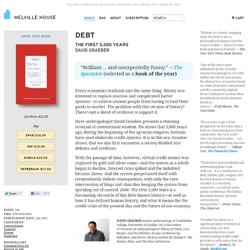
—The Spectator (selected as a book of the year) Every economics textbook says the same thing: Money was invented to replace onerous and complicated barter systems—to relieve ancient people from having to haul their goods to market. David Graeber’s Debt: My First 5,000 Words. In the final lines of his introduction to Debt: The First 5,000 Years, David Graeber writes that “[f]or a very long time, the intellectual consensus has been that we can no longer ask Great Questions.”
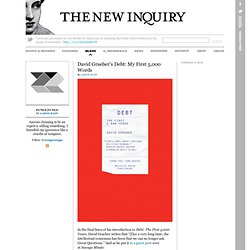
And as he put it in a guest post over at Savage Minds: The aim of the book was to write the sort of book people don’t write any more: a big book, asking big questions, meant to be read widely and spark public debate…[T]he credit crisis —and near collapse of the global economy in 2008—afforded the perfect opportunity. In the wake of the disaster, it was as if suddenly, everyone wanted to start asking big questions again. Even The Economist, that bastion of neoliberal orthodoxy, was running cover headlines like “Capitalism: Was It A Good Idea?” (my italics)